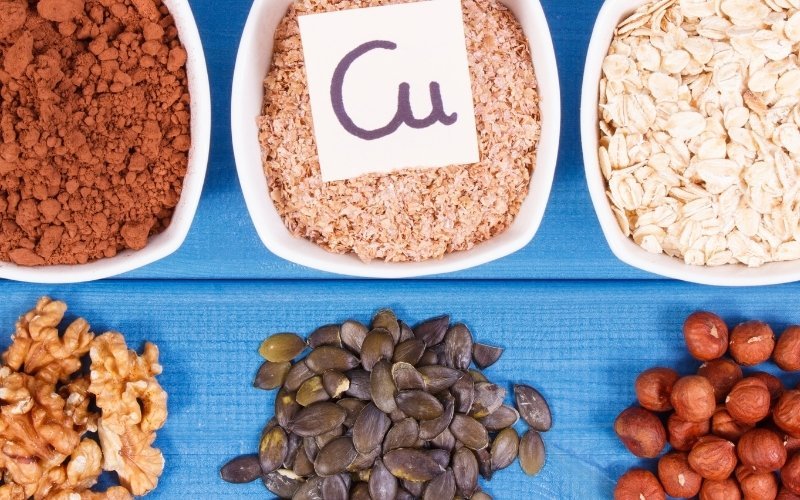Copper plays an integral role in maintaining most of our bodily functions. It is a trace mineral that is necessary for our survival.
With many different functions and responsibilities, do you need to increase your copper intake? No! Copper deficiencies are rare. To quote Anthony Wedd, a professor researching Menkes disease, a condition that affects internal regulation of copper, “Copper is almost everywhere, in most foods”. So you don’t have to worry about being copper-deficient unless you eat ice for breakfast, dinner, and lunch.
In this article, we explore further to understand whether there are benefits of drinking copper water and do away with all the myths and acquaint you with reality.
Copper water refers to water stored overnight in copper vessels or bottles. Drinking water from copper glass or vessels lined with stainless steel doesn’t come under the purview of this article as they don’t get infused with copper.
The Role of Copper in our Metabolism
Apart from producing red blood cells, copper is also involved in maintaining the functions of nerve cells and the immune system.
Let’s have an in-depth analysis of the role of copper in maintaining our bodily functions and metabolism:
Production of Red Blood Cells:
Copper and iron are vital ingredients that the body uses to formulate red blood cells. The red blood cells, in turn, are responsible for the streamlined transfer of oxygen from our lungs to the rest of the body.
Collagen Formation:
Two of the major structural components found in our body are collagen and elastin. Copper contributes to the formation of both these components. If there’s a deficiency of copper in our bodies, we won’t replace any damaged or injured connective tissue or the collagen essential for supporting the bone structure. A shortage of copper can lead to joint problems or internal tissues breaking down, causing long-term health problems.
Digestion:
Digestion is one of the most important metabolic processes in our body. Copper aids our digestive abilities through properties that stimulate peristalsis. Copper intake can thus make the digestion process smoother and quicker.
You may also like: Health Benefits of Cast Iron Cookware- Myths and Facts
Requirements: How much copper do we need?

Even though dieticians recommend consuming a healthy amount of copper, we need to know our limits.
Taking in too much copper can lead to copper toxicity. Over time, someone who has been consuming too much copper can face liver damage, cramps, nausea, diarrhoea etc.
As per DRI (Dietary Reference Intakes), the Recommended Dietary Allowance (RDA) for copper intake is around 900 micrograms (mcg) per day for adolescents and adults. These figures may vary for different age groups and categories.
Related reading: How To Clean Copper Bottles?
All You Need To Know About Soapstone Cookware
What Foods Contain Copper?
As mentioned earlier, most foods contain at least some amount of copper.
According to the Office of Dietary Supplements, National Institutes of Health, the richest sources of copper are shellfish, seeds, nuts, organ meats, wheat-bran cereals, whole-grain products, and chocolate.
Moreover, we can also get some amount of copper from tap water and other beverages. But the amount of copper that our body absorbs in liquid form varies depending upon the source.
Related reading: How To Make Nannari Syrup?
The Myth Surrounding Copper – Are Copper Vessels Good for our Health?

Backed by Ayurveda, people are increasingly adopting copper bottles. HUL has even introduced a water purifier that infused copper ions into the water.
There have been widespread claims that storing water in copper vessels is beneficial for our health. Such claims are built on the base that the water stored in a copper vessel undergoes a naturally occurring purification process. People believe that copper vessels can kill all the microbes, algae, fungi, and bacteria present in water. Moreover, the claims also state that some copper from the vessel would ultimately leach into the water. In due course, our copper intake would increase, thus benefiting our overall health.
But are these claims backed up by science and research? Is there a firm conclusion to this seemingly never-ending debate? Let’s find out.
The Science Behind the Claims
The Journal of Health, Population and Nutrition conducted a study to verify the benefits of drinking copper water. The main motive of the study was to find out the possibility of providing safe drinking water to developing countries without the use of sophisticated and expensive techniques. Using copper vessels to purify water seemed like the perfect solution to the growing problem of unsafe drinking water.
Thus, they conducted numerous studies to study and analyze the effect of copper vessels on microbe and bacteria-infested water.
After a thorough examination, they concluded that copper vessels are, indeed, successful in purifying water to some extent. After storing contaminated water for 16 hours in a copper vessel, no bacteria could be recovered. The copper content of the water increased to 177 mcg/litre.
But note that drinking water from copper glasses or cups doesn’t really have any benefit. This is because the water doesn’t rest enough time to absorb copper ions from the cup.
Conclusion
The research we quoted above shows 177mcg of copper leaches into 1 litre of water when stored for 16 hours. A litre of copper water could amount to almost 20% of recommended dietary intake.
But the fact remains that most people don’t have a copper deficiency. So, drinking water in copper bottles wouldn’t really have any profound benefits on your health.
As for copper toxicity, you needn’t worry too much either because it results only when the dietary intake ranges more than 7800-10,000 mcg per day.
So, drinking water stored in a copper bottle overnight will definitely help purify it. But, there is no scientific evidence that this can improve health, as most people do not lack copper to begin with.
